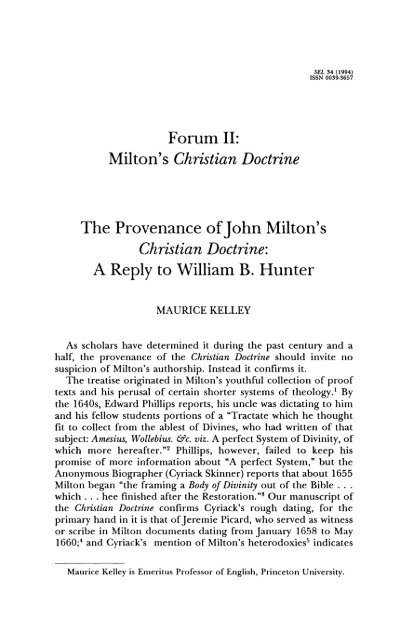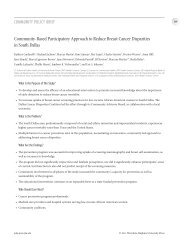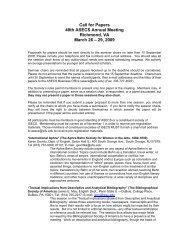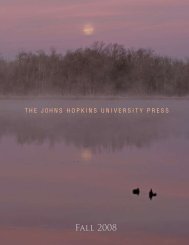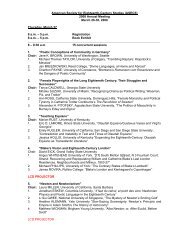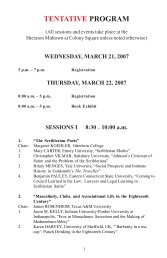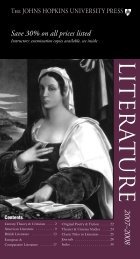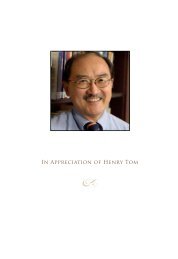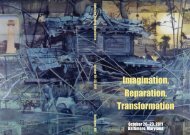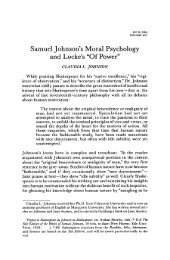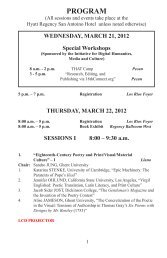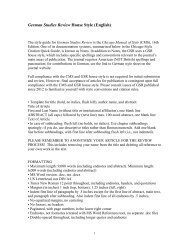The Provenance of John Milton's Christian Doctrine - The Johns ...
The Provenance of John Milton's Christian Doctrine - The Johns ...
The Provenance of John Milton's Christian Doctrine - The Johns ...
You also want an ePaper? Increase the reach of your titles
YUMPU automatically turns print PDFs into web optimized ePapers that Google loves.
SEL 34 (1994)ISSN 0039-3657Forum II:<strong>Milton's</strong> <strong>Christian</strong> <strong>Doctrine</strong><strong>The</strong> <strong>Provenance</strong> <strong>of</strong><strong>John</strong> <strong>Milton's</strong><strong>Christian</strong> <strong>Doctrine</strong>:A Reply to William B. HunterMAURICE KELLEYAs scholars have determined it during the past century and ahalf, the provenance <strong>of</strong> the <strong>Christian</strong> <strong>Doctrine</strong> should invite nosuspicion <strong>of</strong> <strong>Milton's</strong> authorship. Instead it confirms it.<strong>The</strong> treatise originated in <strong>Milton's</strong> youthful collection <strong>of</strong> pro<strong>of</strong>texts and his perusal <strong>of</strong> certain shorter systems <strong>of</strong> theology.' Bythe 1640s, Edward Phillips reports, his uncle was dictating to himand his fellow students portions <strong>of</strong> a "Tractate which he thoughtfit to collect from the ablest <strong>of</strong> Divines, who had written <strong>of</strong> thatsubject: Arnesius, Wollebius. &c. viz. A perfect System <strong>of</strong> Divinity, <strong>of</strong>which more hereafter."2 Phillips, however, failed to keep hispromise <strong>of</strong> more information about "A perfect System," but theAnonymous Biographer (Cyriack Skinner) reports that about 1655Milton began "the framing a Body <strong>of</strong> Divinity out <strong>of</strong> the Bible . . .which . . . hee finished after the Restoration."3 Our manuscript <strong>of</strong>the <strong>Christian</strong> <strong>Doctrine</strong> confirms Cyriack's rough dating, for theprimary hand in it is that <strong>of</strong>Jeremie Picard, who served as witnessor scribe in Milton documents dating from January 1658 to May1660;4 and Cyriack's mention <strong>of</strong> <strong>Milton's</strong> heterodoxies5 indicatesMaurice Kelley is Emeritus Pr<strong>of</strong>essor <strong>of</strong> English, Princeton University.
154REPLY TO HUNT E Rthat he is writing <strong>of</strong> the <strong>Christian</strong> <strong>Doctrine</strong> that we have today.Parallels between the treatise and Paradise Lost as well as betweenit and <strong>Milton's</strong> Art <strong>of</strong> Logic, not published until 1672,6 confirm<strong>Milton's</strong> authorship <strong>of</strong> the systematic theology. <strong>Milton's</strong> frequentborrowings from Wollebius, especially in Book 2 <strong>of</strong> the <strong>Christian</strong><strong>Doctrine</strong>, connect it with Phillips's "A perfect System," and theplethora <strong>of</strong> pro<strong>of</strong> texts in Book 2 recall <strong>Milton's</strong> youthfulcollection. Finally, from what we find in <strong>Milton's</strong> works and life,this revision <strong>of</strong> his "A perfect System" was to be expected, forduring the decade <strong>of</strong> 1645-1655 his religious beliefs had radicallychanged: he no longer accepted the Nicene doctrine <strong>of</strong> the Trinity,and to <strong>John</strong> Calvin's doctrine <strong>of</strong> predestination he had biddengoodbye. Consequently, if <strong>Milton's</strong> accounting to the Lord was tobe accurate and up-to-date, he must revise the early chapters <strong>of</strong>Book 1, where those heads <strong>of</strong> doctrine appear.With its careful calligraphy and ornate chapter headings, thePicard manuscript was intended to be a fair copy; but during the1660s Milton, with the help <strong>of</strong> an unknown number <strong>of</strong> amanuenses,transformed it into a working copy by adding corrections andrevisions throughout its 745 pages, most heavily in the firstfourteen chapters (pp. 1-196). In this state at <strong>Milton's</strong> death, thePicard draft came into the possession <strong>of</strong> Daniel Skinner. At themost, Skinner had the manuscript in his possession for about ayear, during which time he prepared it for the printer DanielElzevir.7 He recopied the heavily revised first fourteen chapters,made the manuscript more readable by recopying insertions,deletions, and pasted slips; and furnished the author's name forthe otherwise anonymous treatise. Elzevir also had the manuscriptfor about a year. During this period he submitted it to the eminentDutch divine Philippus van Limborch, who advised Elzevir not toprint it because <strong>of</strong> the Arianism <strong>of</strong> the document. By then anextreme winter had set in and not until spring allowed navigationdid Skinner's father receive the manuscript from Elzevir andpromptly turn it over to Joseph Williamson. With the rest <strong>of</strong> hispapers, Sir Joseph left it in the government archives where RobertLemon, Sr., happened on it in 1823.This, then, is the provenance <strong>of</strong> <strong>Milton's</strong> <strong>Christian</strong> <strong>Doctrine</strong>. <strong>The</strong>manuscript was prepared at a known time, in a known place, by aknown person to whom Milton assigned among other tasks therecording <strong>of</strong> family deaths in his family bible and the transcribing<strong>of</strong> his twenty-third sonnet, on his deceased wife, on paper that wasto become the last leaf <strong>of</strong> the Trinity College Manuscript. On thisleaf, Samuel Leigh Sotheby writes: "<strong>The</strong> leaf on which these twoSonnets [22, 23] are written, has been taken from another volume.
MAURICEKELLEY155<strong>The</strong> paper is <strong>of</strong> the same quality and size as some <strong>of</strong> that used inthe latter portion <strong>of</strong> the manuscript De Doctrina <strong>Christian</strong>a,preserved in the State Paper Office."8 This is the manuscript (SP9/61) that Skinner took from the deceased <strong>Milton's</strong> effects,prepared for the compositor, and sent to Elzevir. This is themanuscript that Elzevir returned to Skinner's father, who passedit on to SirJoseph Williamson. This is the manuscript that Lemonfound and Sumner edited. So to establish his thesis that Miltondid not write the <strong>Christian</strong> <strong>Doctrine</strong> Hunter has the task <strong>of</strong>explaining how a manuscript with such close association withMilton was not composed by Milton.9 For a moment on page 137he gives us a peek by suggesting that Skinner perpetrated thefraud: "two manuscripts which he could assign to a famous butnow late poet who could not correct him." Two pages later,however, Mr. Hunter writes, "Skinner, incidentally, may havehonestly believed that Milton was [the manuscript's] source." S<strong>of</strong>ar as I can see, Mr. Hunter has not made his case. He has notnamed who managed the fraud, when the fraud took place, ordescribed how it was executed. But even if he has, he still mustcope with "what is in fact the nub <strong>of</strong> the matter-the question <strong>of</strong>consonance between this tract and <strong>Milton's</strong> poems"10-suchlikenesses as those <strong>of</strong>fered in Yale Prose, 6:109-15; or, as anineteenth-century English historian fresh from the struggle withBishop Burgess put it, to account for "the passages produced from<strong>Milton's</strong> other writings [which] leave no doubt, that the 'Treatiseon <strong>Christian</strong> <strong>Doctrine</strong>' emanated from the same mind."11IIIn addition to Mr. Hunter's failure to divest Milton <strong>of</strong> <strong>Christian</strong><strong>Doctrine</strong>, his article contains several questionable matters whichcall for correction so that he may not lead future Miltonists intohis bog <strong>of</strong> error. In the following numbered sections, Mr. Hunter'swords appear first; my comments then follow.(1)"Another question is why he [Milton] did not [print the <strong>Christian</strong><strong>Doctrine</strong>] then, an easy feat before the Restoration" (p. 130).<strong>The</strong> Anonymous Biographer [Cyriack Skinner] gives anunderstandable reason-the manuscript's heresies: "and thereforehis Judgment in his Body <strong>of</strong> Divinity concerning some speculativepoints, differing perhaps from that commonly receivd (and which
MAURICEKELLEY157capitals to indicate that he wanted upper case letters. Skinner'sprinting over his supralinear flourishes on page 1, I did notconsider "crowding." Page 7, however, is another matter. Whoeverprepared it for the cut used on page 134 carelessly overtrimmedthe upper margin and cut <strong>of</strong>f the tops <strong>of</strong> some <strong>of</strong> Skinner's letters.A xerox <strong>of</strong> page 7 shows ample room above Skinner's addition. Asfor the erosion <strong>of</strong> the inscriptions (p. 140, n. 22) I suggest that ithas been caused by the heavier application <strong>of</strong> the ink in thecapitals. When I last used SP 9/61, in 1967, I noticed erosion inthe more heavily inked chapter headings but none in the morelightly penned text below. Skinner's inscription on the frontispiece(p. 140, n. 22) was left <strong>of</strong>f the reproduction because the purpose<strong>of</strong> the page was to illustrate the chief hands in the text, andSkinner's printing did not qualify as a chief hand.(4)"With regard to Skinner's relationship to the theologicalmanuscript ... it has been assumed that he did so to clean up thetext for the printer . . . but that is a questionable assumptionbecause, as Kelley observes, his 'clean' copy is far more smittenwith errors than the manuscript <strong>of</strong> Picard" (p. 137).Skinner's work was not "to clean up the text," but to help thecompositor find his way through the thicket <strong>of</strong> additions to andrevisions <strong>of</strong> the text, to make clear what went where. My note (YaleProse 6:38, n. 8) did not take into consideration the limited timethat Skinner had for his work, probably less than a year; whereasthe multitude <strong>of</strong> textual corrections (see GA, pp. 231-42) suggeststhat Picard had plenty <strong>of</strong> time to correct his errors. I should neverhave made this unfair comparison.(5)"His [Skinner's] reason for getting possession <strong>of</strong> bothmanuscripts and his attempt to publish them are clear. In 1676 hewas on the edge <strong>of</strong> an appointment to Trinity College (which hefinally got) and he evidently believed (wrongly) that his publication<strong>of</strong> two manuscripts which he could assign to a famous but nowlate poet who could not correct him might help him to a politicalappointment in Holland" (p. 137).Here Mr. Hunter is confused. Skinner had been a junior Fellowat Trinity since 22 October 1674. His motive for publishing thetwo manuscripts, as Masson suggests, was financial.13 Skinner was
158REPLY TO HUNTERspending too much time in London, and his father wanted to gethis son back to Cambridge "by stopping supplies." <strong>The</strong> son wasreduced to borrowing ten pounds from Samuel Pepys. At thesame time, Isaac Barrow, Master <strong>of</strong> Trinity, was threateningSkinner with expulsion if he did not without delay "repair hitherto the college." Skinner however did not heed Barrow's threat,and went through <strong>The</strong> Netherlands to France. For thisinsubordination he eventually paid. Almost three years later, 23May 1679, Skinner was admitted and sworn major Fellow. <strong>The</strong>interval between first and second admission usually did not exceeda year and a half.Also, only one manuscript figured in the political appointment,the Letters <strong>of</strong> State (SP 9/194), and the "now late poet," even ifrevivified, could not deny <strong>Milton's</strong> connection with the letters.(6)"<strong>The</strong> description <strong>of</strong> Paradise Lost and Paradise Regained as worksin which 'hee more specially taught all Virtue' is somewhateccentric. Facts like these suggest that the author <strong>of</strong> the[Anonymous] Biography was not a close associate at the timewhen he was supposedly dictating the <strong>Christian</strong> <strong>Doctrine</strong>. If indeedit was Cyriack Skinner he was busy setting up his own householdthen" (p. 138).Milton invested most, if not all, <strong>of</strong> his salary (about ?2000) inexcise bonds. On 5 May 1660, in an attempt to salvage them,Milton transferred an excise bond (and very probably all <strong>of</strong> them)to Cyriack Skinner. <strong>The</strong> transaction was witnessed by JeremiePicard.'4 Parker also lists Skinner as "most knowledgeable" aboutMilton in 1644-1647, 1649-1655, 1660, and 1670.15(7)"<strong>The</strong> Poem [Paradise Lost], as I have said and repeat here frommy paper, is based in part on a subordinationist view <strong>of</strong> theGodhead" (p. 165). "Subordination, as I have defined it elsewhere,undergirds much <strong>of</strong> the theology <strong>of</strong> the poem" (p. 165). "On theother hand, the poem indeed has, as C.A. Patrides,J.H. Adamson,and I have shown, a subordinationist underpinning" (p. 132).Yes, subordinationism does undergird much <strong>of</strong> Paradise Lost;but that subordinationism is not Mr. Hunter's orthodox, ante-Nicene subordinationism joined to the doctrine <strong>of</strong> the two-stage
MAURICE KELLEY 159Logos. As Michael Bauman has shown, Mr. Hunter is wrong intwo ways.'6 <strong>The</strong> two-stage Logos is not orthodox, and Milton doesnot teach it. To which I add, the <strong>Christian</strong> <strong>Doctrine</strong> rejects it: "If he[the Son] was once in the Father but now exists separately, then hemust once have undergone a change, and is therefore mutable."17In its anathemas, the Nicene Creed curses those who hold that theSon "is created or is subject to change."Mr. Hunters ante-Nicene subordinationism cannot becomeorthodox merely by his placing the adjective in front <strong>of</strong> it. <strong>The</strong>New Catholic Encyclopedia defines subordinationism as "the heresy,originating in the 4th century, that admitted only the Father astruly God and taught the inferiority (subordination) <strong>of</strong> the Son tothe Father and <strong>of</strong> the Holy Ghost to the Father and the Son."1SSubordination can become orthodox only by affirming the equality<strong>of</strong> the Father, Son, and Holy spirit-then it is no longersubordinationism. So those who do not like to believe that theauthor <strong>of</strong> Paradise Lost denied the doctrine <strong>of</strong> the Trinity and whouncritically embraced Mr. Hunter's homemade brand <strong>of</strong> orthodoxymust seek elsewhere for a term to soothe their sensibilities.After Mr. Bauman's attack, Mr. Hunter's aggressive reassertion<strong>of</strong> his version <strong>of</strong> <strong>Milton's</strong> subordinationism surprises me, for I toohave challenged Mr. Hunter's patristic origin <strong>of</strong> <strong>Milton's</strong>antitrinitarianism, finding <strong>Milton's</strong> chapters on the Son <strong>of</strong> Godand the Holy Spirit classic examples <strong>of</strong> Renaissanceantitrinitarianism-a fresh product <strong>of</strong> Renaissance rationalismrather than a continuous development out <strong>of</strong> the Middle Ages.19When challenged as Mr. Hunter has been, the practices <strong>of</strong>scholarship dictate that he must either rebut or recant. Mychallenge was in 1972; Mr. Bauman's in 1987; and Mr. Hunter hasneither rebutted not recanted; so he consequently invites thecharge <strong>of</strong> being pro<strong>of</strong>-pro<strong>of</strong>: "standing out against pro<strong>of</strong>;unaffected by pro<strong>of</strong>."20(8)"But the parallels are only in the commonplaces <strong>of</strong> Calvinism.<strong>The</strong>re are simply no analogues between the Ames-Wollebiusmaterials and the discussion in the treatise <strong>of</strong> subjects like theTrinity, the Incarnation, predestination, baptism, and so on. Noris any to be expected with those two bastions <strong>of</strong> Calvinism" (p.141).If no parallels are to be expected, then why bring up "subjectslike the Trinity, the Incarnation" etc.? But if the reader will consult
160REPLY TO HUNTERYale Prose, 6:226, n. 59, he will find Wollebius determining theorder <strong>of</strong> discussion in the first <strong>of</strong> <strong>Milton's</strong> three main propositionsin his chapter 5, "Of the Son <strong>of</strong> God," as well as my directions topursue the matter further in chapter 6, "Of the Holy Spirit."Using the index to Yale Prose, 6, let the reader check the influence<strong>of</strong> Wollebius on <strong>Milton's</strong> Book 2 <strong>of</strong> the treatise. He will then beprepared to evaluate Mr. Hunter's statements and be on guardagainst his too insistent effort to insure a verdict in favor <strong>of</strong> hisbrief.(9)"Skinner, who seems to have talked freely about his twomanuscripts" (p. 163); "He [Skinner] advertised the fact widelyand at the same time spread some idea <strong>of</strong> its contents and hisplan to publish it" (p. 139); In conclusion I suggest that [theAnonymous Biography] relies for these years upon the samerumors about the treatise that the other biographers had alsoheard, emanating ultimately from Daniel Skinner and includingthe rejection <strong>of</strong> the manuscript by Elzevir on the grounds <strong>of</strong> itsheresies" (pp. 138-39).As our old Princeton pr<strong>of</strong>essor Gordon Gerould would haveput it, Mr. Hunter, I believe, "is drawing a long bow." Documentthese statements, and I will apologize.(10)"<strong>The</strong> late C.A. Patrides, accepting <strong>Milton's</strong> authorship,considered it [<strong>Christian</strong> <strong>Doctrine</strong>] as a gross statement <strong>of</strong> theology,unworthy <strong>of</strong> him" (p. 140).I meet this denigratory appraisal so frequently in my readingthat I am sick and tired <strong>of</strong> its repetition. Mr. Patrides nevercomprehended what Milton meant by Substantia2' and he suggeststhat we read Paradise Lost by a hermeneutic principle that Miltoncondemns.22 <strong>The</strong>se failings hardly indicate that Mr. Patrides is tobe considered a qualified critic <strong>of</strong> systematic theologies.(11)Now to <strong>John</strong> Shawcross, apparently regarding Mr. Hunter'snumber 5 above:23 "We should probably note that it has been
MAURICEKELLEY161suggested that the Trinity MS is owned by Trinity College Librarybecause Skinner may have used it as a kind <strong>of</strong> bribe to become amember <strong>of</strong> the College. We should also note that Zacharias Conradvon Uffenbach had reported that a bookseller (Moses Pitt?<strong>John</strong> orPeter Blaeu?) had-'ein Systema <strong>The</strong>ologie von Milton' whichevidenced 'Arianismus.'" (pp. 161-62).Mr. Shawcross is indeed confused, if not befuddled. Skinnerwas already a Fellow <strong>of</strong> Trinity when he helped himself to <strong>Milton's</strong>papers in 1674, and the Trinity manuscript was just a bunch <strong>of</strong>loose papers from two collections until they were assembled andbound in a single volume in the eighteenth century. Daniel Elzevirhad the <strong>Christian</strong> <strong>Doctrine</strong> manuscript; Pitt and Blaeus were involvedin another work <strong>of</strong> Milton-the 1676 edition <strong>of</strong> Literae Pseudo-Senatus Anglicani Cromwellii.And now may I express my appreciation <strong>of</strong> how neatly andsuccinctly Barbara Lewalski has replied to Mr. Hunter with thelogical force and learning that we have come to expect <strong>of</strong> her-andcovering all bases so well that I had the freedom to wander about,picking and choosing as I list.Post Scriptum:In his attempt to decanonize <strong>Milton's</strong> treatise, Mr. Hunter'ssecond paper, a year later, "<strong>The</strong> <strong>Provenance</strong> <strong>of</strong> the <strong>Christian</strong><strong>Doctrine</strong>: Addenda from the bishop <strong>of</strong> Salisbury," helps little, if atall.24 It consists largely <strong>of</strong> 1) re-presenting the bishop's argumentsand <strong>of</strong> giving guarded approval to the bishop's perverse reading<strong>of</strong> an excerpt from Of True Religion (both <strong>of</strong> which failed to beconvincing to the bishop's Georgian readers); <strong>of</strong> 2) pointing outpassages in the <strong>Christian</strong> <strong>Doctrine</strong> where the bishop and/or Mr.Hunter find disagreement with <strong>Milton's</strong> unquestioned works(where agreement, as Ms. Lewalski reminds us, is the nub <strong>of</strong> thematter); and <strong>of</strong> 3) the following scenario explaining how the<strong>Christian</strong> <strong>Doctrine</strong> came into <strong>Milton's</strong> possession (pp. 200-201):"Because the Treatise turned up among <strong>Milton's</strong> effects . . . one<strong>of</strong> his [<strong>Milton's</strong>] Dutch associates who gave or loaned him themanuscript may be considered as its author. Such a possibility isIsaac Vossius (1618-1689)," who settled in London in 1670 "anddirect association with Milton became distinctly possible, thoughno early biographer mentions it. ... From its origin in this midcenturyArminian Dutch context, Jeremie Picard made a copy <strong>of</strong>the manuscript."
162REPLY TO HUNTERA direct association <strong>of</strong> Vossius with Milton may have beenpossible, but was it probable? Could Vossius, a frequenter <strong>of</strong>Charles IHs court, afford to be seen with Milton-a man who hadapproved <strong>of</strong> and publicly defended the execution <strong>of</strong> the presentking's father? At least a decade separates Picard's work in theMilton household from Vossius's arrival in England. No ArminianDutch manuscript is known to exist or to be vouched for bydocumentation. It and the Dutch associate supposed to be theauthor <strong>of</strong> the <strong>Christian</strong> <strong>Doctrine</strong> are figments <strong>of</strong> the bishop's andMr. Hunter's imaginations, conjured up to meet the needs <strong>of</strong> theirtheory. In short, these two gentlemen are endeavoring to persuadeus to substitute their invented provenance for the David Masson,James Holly Hanford, and William Riley Parker discoveredprovenance, a provenance disclosed over the years by seventeenthcenturydocuments, frequently being perused for purposes otherthan determining the author <strong>of</strong> the <strong>Christian</strong> <strong>Doctrine</strong>. Thissubstitution I am not persuaded to make.NOTES'Complete Prose Works <strong>of</strong> <strong>John</strong> Milton, ed. Don Wolfe et al., 8 vols. (NewHaven and London: Yale Univ. Press, 1953-82), 6:119-20. Henceforth YaleProse.'Maurice Kelley, This Great Argument: A Study <strong>of</strong> <strong>Milton's</strong> "De Doctrina<strong>Christian</strong>a" as a Gloss upon "Paradise Lost" (Princeton: Princeton Univ. Press,1942), p. 10. Hereafter GA.GA, p. 9.4James Holly Hanford, "<strong>The</strong> Date <strong>of</strong> <strong>Milton's</strong> De Doctrina <strong>Christian</strong>a," SP17, 3 (July 1920): 309-19."'And therefore his Judgment in his Body <strong>of</strong> Divinity concerning somespeculative points, differing perhaps from that commonly receivd, (and whichis thought to bee the reason that never was printed) neither ought rashly tobee condemnd, and however himselfe not to bee uncharitably censurd; whoby beeing a constant Champion for the liberty <strong>of</strong> Opining, expressed muchCandor towards others" (GA, p. 9).'This means that Mr. Hunter's author <strong>of</strong> the <strong>Christian</strong> <strong>Doctrine</strong> would haveto have had <strong>Milton's</strong> MS <strong>of</strong> the Art <strong>of</strong> Logic.7Milton died 8 November 1674 and Daniel Elzevir in a letter dated 20November 1676 writes, "It is about a year since I agreed with Mr Skinner toprint the Letters <strong>of</strong> Milton and another manuscript on <strong>The</strong>ology" (H.Scherpbier, Milton in Holland: A Study in the Literary Relations <strong>of</strong> England andHolland before 1730 [Amsterdam: HJ. Paris, 1933], p. 58).'Samuel Leigh Sotheby, Ramblings in the Elucidation <strong>of</strong> the Autograph <strong>of</strong>Milton, (London: Thomas Richards, 1961), p. 95.9William B. Hunter, "<strong>The</strong> <strong>Provenance</strong> <strong>of</strong> the <strong>Christian</strong> <strong>Doctrine</strong>," SEL 32,1 (Winter 1992): 129-142. Hereafter cited parenthetically by page in the text.
MAURICEKELLEY163'?Barbara K. Lewalski, "Forum: <strong>Milton's</strong> <strong>Christian</strong> <strong>Doctrine</strong>," SEL 32, 1(Winter 1992): 143-154, 144."Robert Wallace, Antitrinitarian Biography, 3 vols. (London, 1850), 3:347.12GA, p. 9.'3David Masson, <strong>The</strong> Life <strong>of</strong><strong>John</strong> Milton, 7 vols. (rprt. Gloucester, MA: PeterSmith, 1965), 6:72."William Riley Parker, Milton: A Biography, 2 vols. (Oxford: ClarendonPress, 1968), 1:562.'5Parker, l:xiii.'6Michael Bauman, <strong>Milton's</strong> Arianism, Sprache und Literatur: RegensburgerArbeiten zur Anglistik und Amerikanistik 26 (New York: Peter Lang, 1987),pp. 120-32. Not well-known to Miltonists, Bauman is pr<strong>of</strong>essor <strong>of</strong> <strong>Christian</strong>Thought at Hillsdale College and has a Fordham degree in Historical<strong>The</strong>ology. His book has yet to receive the attention that it merits. Itsthoroughness and clarity should make it the definitive work on this aspect<strong>of</strong> <strong>Milton's</strong> theology.'7Yale Prose, 6:262.'8New Catholic Encyclopedia, 13:761; s.v. Subordinationism. Continuing, theencyclopedia does not accord subordinationism the dignity <strong>of</strong> a movement;"Certain expressions, subordinationist in implication, that are found even inorthodox writers <strong>of</strong> the first 3 centuries . . . were due to unskillful andexcessively cautious safeguarding <strong>of</strong> monotheism, and to preoccupation withcombatting Gnostic theories <strong>of</strong> aeons and divine emanations."'9See my review <strong>of</strong> Hunter, C.A. Patrides, andJ.H. Adamsson, eds., BrightEssence: Studies in <strong>Milton's</strong> <strong>The</strong>ology (Salt Lake City: Univ. <strong>of</strong> Utah Press, 1971)in Southern Humanities Review 6, 4 (Fall 1972): 418-19 and Yale Prose, 6:65-66.^Webster's New Universal Unabridged Dictionary, 2nd edn., s.v. pro<strong>of</strong>-pro<strong>of</strong>.21Bright Essence, p. 5; Bauman, p. 83; Lewalski, p. 151.22Bright Essence, pp. 71-77 with Yale Prose, 6:223-26."<strong>John</strong> T. Shawcross, "Forum: <strong>Milton's</strong> <strong>Christian</strong> <strong>Doctrine</strong>," SEL 32, 1(Winter 1992): 155-62.24Hunter, "<strong>The</strong> <strong>Provenance</strong> <strong>of</strong> the <strong>Christian</strong> <strong>Doctrine</strong>: Addenda from theBishop <strong>of</strong> Salisbury," SEL 33, 1 (Winter 1993): 191-207. In his openingparagraph Mr. Hunter explains the Bishop's connection with his topic:When I was investigating the provenance <strong>of</strong> the <strong>Christian</strong> <strong>Doctrine</strong>, afrequently heterodox theological treatise that has been assigned to <strong>John</strong>Milton ever since its discovery in 1823, I came across another writer, ThomasBurgess (1756-1837), Bishop <strong>of</strong> Salisbury, who had argued objections to<strong>Milton's</strong> authorship similar to mine. Because his views had been dismissedby everyone concerned with the authenticity <strong>of</strong> the ascription to Milton, I didnot follow up this lead; I now know that I should have, because the Bishophas left a number <strong>of</strong> astute observations which are certainly worthconsideration today.


